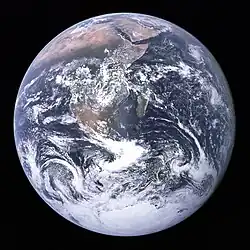地球
Chinese
earth; ground; field earth; ground; field; place; land; (subor. part. adverbial); ‑ly |
ball; sphere | ||
|---|---|---|---|
| trad. (地球) | 地 | 球 | |
| simp. #(地球) | 地 | 球 | |
Etymology
Coined by Matteo Ricci (Huang, 2003).
Pronunciation
Proper noun
地球
Coordinate terms
Derived terms
Japanese
| Kanji in this term | |
|---|---|
| 地 | 球 |
| ち Grade: 2 |
きゅう Grade: 3 |
| kan’on | |

Etymology
From Chinese 地球 (Dìqiú), coined by Matteo Ricci.[1]
Proper noun
- (astronomy, mythology) Earth; Terra
- 地球は24時間で1回自転します。
- Chikyū wa nijūyo-jikan de ikkai jiten shimasu.
- The Earth rotates once every 24 hours.
- 地球は太陽系の第3惑星です。
- Chikyū wa taiyōkei no dai-san wakusei desu.
- The Earth is the third planet of the Solar System.
- それでも地球は動く。
- sore de mo Chikyū wa ugoku.
- And yet the Earth moves.
- 1988 July 30 [Jul 25 1984], Fujiko F. Fujio, “世界名作童話第3巻 うらしま太郎 [World’s Renowned Fairy Tales Book 3: Urashima Tarō]”, in ポストの中の明日 [Post-Mid-Tomorrow] (藤子不二雄少年SF短編集; 2), volume 2 (fiction), 10th edition, Tokyo: Shogakukan, →ISBN, page 117:
- 地球は、サルのわく星になっていましたとさ。
- Chikyū wa, saru no wakusei ni natteimashita to sa.
- Meanwhile, Earth became the planet of the apes.
- 地球は、サルのわく星になっていましたとさ。
- 1999 October 17, “異次元からの侵略者 [Invader from a Different Dimension]”, in Booster 5, Konami:
- 銀河系の外から地球にやってきた宇宙人。
- Gingakei no soto kara Chikyū ni yattekita uchūjin.
- An alien that came to Earth from outside the Milky Way.
- 銀河系の外から地球にやってきた宇宙人。
- 地球は24時間で1回自転します。
Derived terms
Derived terms
- 地球温暖化 (chikyū ondanka): global warming
- 地球化学 (chikyū kagaku): geochemistry
- 地球昭 (chikyū shō): earthshine, illuminating the dark part of the Moon
- 地球外 (chikyūgai): extraterrestrial
- 地球外生物 (chikyūgai seibutsu): extraterrestrial life
- 地球外放射線 (chikyūgai hōshasen): extraterrestrial radiation
- 地球環境モニタリングシステム (Chikyū Kankyō Monitaringu Shisutemu): Global Environment Monitoring System (GEMS)
- 地球観測衛星 (chikyū kansoku eisei): Earth survey satellite
- 地球儀 (chikyūgi): terrestrial globe
- 地球型惑星 (chikyūgata wakusei): terrestrial planet, an Earth-like planet
- 地球磁気 (chikyū jiki): geomagnetism, terrestrial magnetism
- 地球周回衛星 (chikyū shūkai eisei): satellite orbiting the Earth, an Earth orbiter
- 地球周回軌道 (chikyū shūkai kidō): Earth orbit, an orbit around the Earth
- 地球楕円体 (chikyū daentai): Earth ellipsoid
- 地球潮汐 (chikyū chōseki): Earth tide, a terrestrial tide
- 地球物理学 (chikyū butsurigaku): geophysics
Related terms
- (planets of the Solar System) 太陽系の惑星 (Taiyōkei no wakusei); 水星 (Suisei, “Mercury”), 金星 (Kinsei, “Venus”), 地球 (Chikyū, “Earth”), 火星 (Kasei, “Mars”), 木星 (Mokusei, “Jupiter”), 土星 (Dosei, “Saturn”), 天王星 (Tennōsei, “Uranus”), 海王星 (Kaiōsei, “Neptune”) (Category: ja:Planets of the Solar System)
- ガイア (Gaia): Gaia or Gaea, the Greek goddess of the Earth
This article is issued from Wiktionary. The text is licensed under Creative Commons - Attribution - Sharealike. Additional terms may apply for the media files.